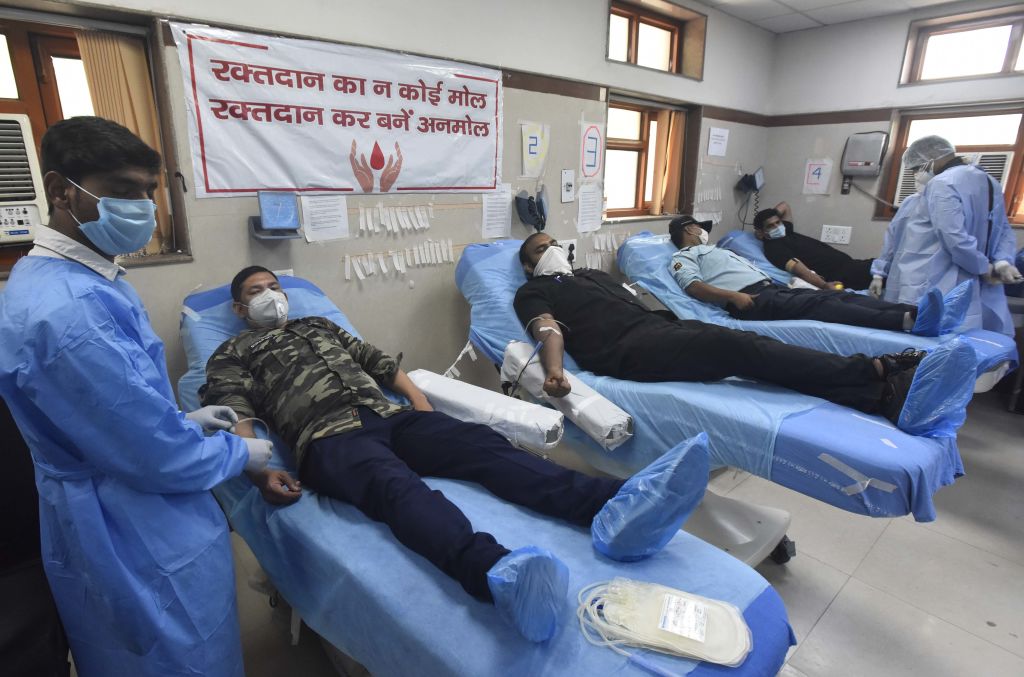
NEW DELHI, INDIA JULY 25: Security staff make donations during a blood and plasma donation camp organised to commemorate Kargil Vijay Diwas, at Safdarjung Hospital, on July 25, 2020 in New Delhi, India. (Photo By Sonu Mehta/Hindustan Times via Getty Images)
Last month, Mandeep (name changed) met with an accident — a bull gored him with its horns, severely injuring him. He was rushed to the Trauma Centre of All India Institute of Medical Sciences (AIIMS). He required transfusion of 10 units of blood, for which his family had to find voluntary donors amid the Covid pandemic.
Blood banks are required to maintain adequate blood inventory, therefore they need to honour every request for blood transfusion. On request, Mandeep was given some units of blood, rest his family had to arrange through voluntary donation. Which he got and was saved.
Government hospitals face numerous such cases on a daily basis, therefore adequate blood supply is critical for the health care system. National blood policy documents say, “An integrated strategy for Blood Safety is required for elimination of transfusion transmitted infections and for provision of safe and adequate blood transfusion services to the people. The main components of an integrated strategy include collection of blood only from voluntary, non-remunerated blood donors, screening for all transfusion transmitted infections and reduction of unnecessary transfusion.”
Since the Covid outbreak, voluntary blood donation has dropped to 30-40 units per facility, which was 150-200 per facility at leading blood banks like Red Cross’s putting patients of haemophilia and thalassemia at high risk.
People are apprehensive about donating blood, due to fear of contracting Covid infection and also of losing immunity. Even those good samaritans who used to donate periodically are not coming. This created so much apprehension that the government had to step in.
In April, the health ministry’s National Blood Transfusion Council (NBTC) had to issue interim guidelines to promote blood donation. NBTC director Dr Shobini Rajan also said, “Individuals are not at risk of contracting Covid-19 through the blood donation process or via a blood transfusion, since respiratory viruses are generally not known to be transmitted by donation or transfusion,” Rajan said.
In India, there are 3,108 licensed blood banks collecting around 12.2 million units. Although, the estimated clinical demand is 14.6 million units of blood, forcing these hospital-based blood banks to rely on replacement donors or blood collected from donors at off‐site voluntary blood donation drives. These centres maintain their blood banks for daily demand and also stock for disruptive events like epidemics.
Patriot’s visit to AIIMS revealed that doctors and patients face difficulty during replacement donation — when a friend or family member of the patient is required to donate blood to replace the stored blood used in a transfusion. This process is done for consistent blood supply. However, when patients require immediate transfusion, they face issues like non-availability of required blood groups or a healthy donor and even reluctance of family members to donate blood.
We spoke to some government doctors. They confirmed that there are a lot of concerns about blood donation and people do not donate easily. However, blood banks, despite local disruptions like dengue, have done a fine job. Still, there have been various concerns about supply management during disruptions like Covid.
A recent study done in the Main Blood Bank, Department of Transfusion Medicine, AIIMS, New Delhi found that starting from the day when the first case of Covid‐19 was reported in the country (29 January) till the end of the first lockdown in India (14 April) there were some significant findings.
Study says, “Maintaining an adequate blood inventory is a dynamic process and requires that blood centres keep an eye on various aspects of blood inventory management. Blood being a perishable product with a limited shelf life (for RBCs with SAGM – 42 days, RDP – 5 days) pose a number of challenges for inventory management. A low inventory exposes to an acute shortage during times of disaster whereas an overfilled inventory may lead to expiry of the blood components. The risk of expiry is more pronounced with platelet concentrates as the expiry period is just 5 days.”
The report found that to meet blood demand during Covid, the buffer stock of 1-2 weeks and strict implementation of FIFO (first in first out) policy — where the oldest blood unit is donated first, helped AIIMS to meet the demand.
Report stressed the importance of maintaining the registry of voluntary donors, which helped AIIMS to get rare blood groups like O negative. “Good coordination with the clinical staff and a prospective review of blood transfusion requests to ensure rational blood transfusion were some of the steps which helped us to successfully maintain transfusion requirements in the initial phases of the Covid‐19 pandemic,” it said.
(Cover: Getty Images)
On the principle of 'Sarvajan Hitaya, Sarvajan Sukhaya' -- Welfare for all, Happiness for all…
With hundreds reported missing in Delhi this year, this guide explains how families can use…
The case came to light after a 35-year-old woman from Panipat alleged that she had…
During the investigation, CCTV footage helped identify the suspects, according to Delhi Police
The launch took place during the inauguration of the Delhi Police Exhibition Hall at Connaught…
The 28-year-old factory owner was taken to Satyawadi Raja Harish Chandra Hospital in Delhi, while…